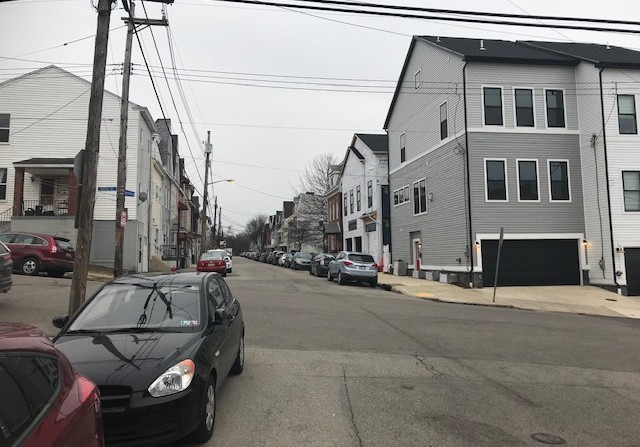In March, Pittsburgh Mayor Bill Peduto introduced a bill that would change the Pittsburgh city zoning code to end the current requirement that new single-family attached dwellings have at least one off-street parking space per unit.
The proposal is meant to decrease the amount of row houses being built with a parking garage and a driveway across the city. In neighborhoods like Lawrenceville, which has a bevy of new single-family dwellings under construction, this is becoming a huge problem. As each of these new homes is forced to require an off-street parking spot, more driveways are being cut into the curbs, which means less on-street parking, less space for trees and vegetation on sidewalks, and more interactions that pedestrians and people with disabilities will have with cars.
Earlier this week, Pittsburgh Planning Commissioners voted to support Peduto’s proposal. This is seen as a victory for pedestrian advocates and for those fighting for neighborhoods to be built for all road users, not just for drivers. The proposal still needs to be approved by Pittsburgh City Council.
But neighborhood advocates worry the new proposal doesn’t go far enough, and only removes a regulation without providing discouragement to building parking garages, whether through city incentives or restrictions.
Lawrenceville United director Dave Breingan spoke at the planning commission meeting, and commended the Peduto administration “for taking steps to improve pedestrian safety, enhancing neighborhood walkability, and promoting non-vehicular mobility.”
However, he said that merely removing the requirement will only lead “community-minded developers” to construct housing without off-street parking and noted that “unfortunately, these developers are an extreme exception.”
“We have taken many, many development projects through our community process and we have pleaded with developers to not include off-street parking on primary streets,” said Breingan in his June 30 testimony, which he shared with Pittsburgh City Paper. “We’ve offered to support their parking variances, but developers have told us again and again that it’s not the zoning code that’s driving their inclusion of integral garages, but market demand.”
Breingen says that developers have told him they include garages in new projects because they perceive they need off-street parking in order to make sales. Even though neighborhoods like Lawrenceville are walkable and well-served by public transit, developers still believe that home buyers are demanding garages. Pittsburgh has relatively high percentages of people who walk, bike, and use public transit to commute. Compared to other similar mid-sized American cities, it's one of the better cities to live without owning a car.
This similar dynamic played out in East Liberty with the proposed redevelopment of the Shakespeare Giant Eagle. Developers there wanted to put in a large amount of parking spots for their mixed-use project that would include retail and housing, despite being located just feet away from one of the busiest transit hubs in the region, the East Liberty Busway station. Only after transit-advocates and city leaders convinced developers that less spaces would make sense, since many residents who live close to the busway use cars far less often than other city residents and parking there is already in over-supply, did the developers work with the city to lower the parking spots proposed at that site.
Breingan said without incentives or disincentives to change developer’s behavior, more curb-cuts and parking garages will be built anyway, and there is nothing the community can do to stop it. Cur- cuts are when sections of curbs are sloped to the street, often to allow for cars to access a driveway or parking garage.
“Consequently, this legislation will not change, in any meaningful way, the continued construction of street-level integral garages, and the permanent damage they do to the public welfare and the essential character of row house neighborhoods like Lawrenceville.” said Breingen in his testimony.
Lawrenceville United is recommending that curb-cuts along primary streets in communities zoned “R1A” should be prohibited, unless granted a special exception. Breingen said this would at least trigger a Zoning Board of Adjustments hearing, which would allow the community to have a say in a new curb-cut. He added that off-street parking from the rear of buildings could still be “permissible by right under the current maximum off-street parking standards.”


